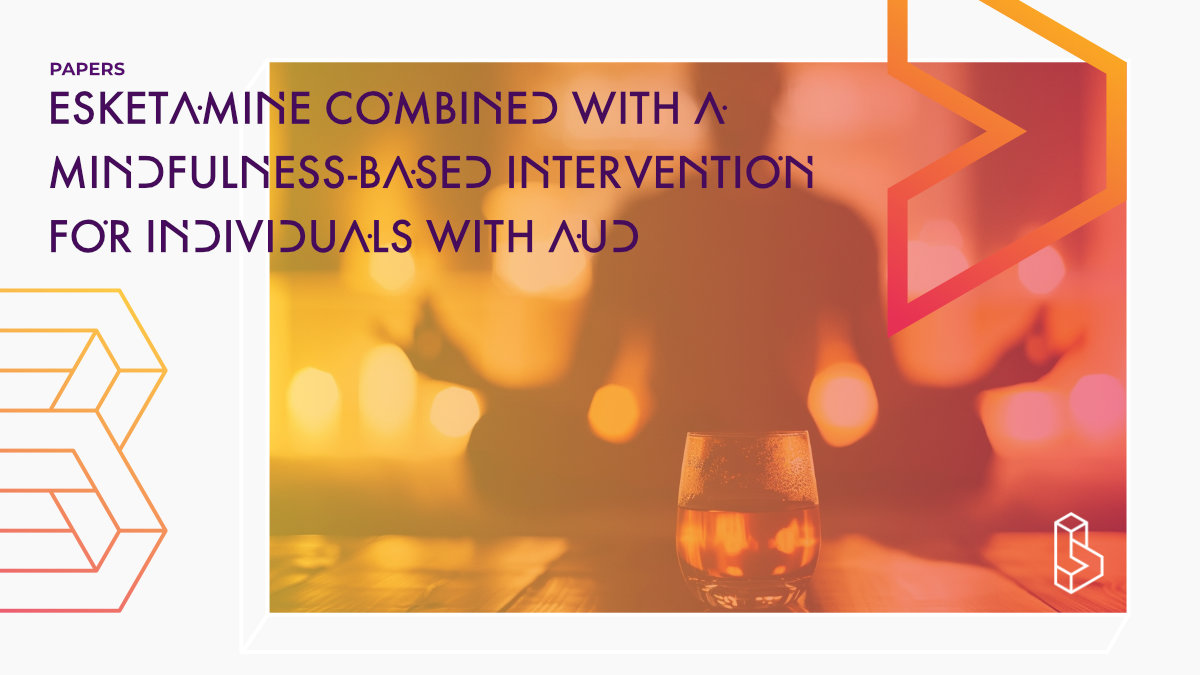This double-blind, pilot study (n=28) investigates esketamine combined with mindfulness-based intervention (MBI) for individuals with alcohol misuse problems. Esketamine enhanced psychological engagement in MBI and transiently decreased alcohol cravings, while also resulting in greater mystical experiences and dissociative states compared to placebo.
Abstract of Esketamine combined with a mindfulness-based intervention for individuals with alcohol problems
“Background: Alcohol use disorder (AUD) is a major public health issue, posing harmful consequences for individuals and society. Recent advances in addiction research have highlighted the therapeutic potential of ketamine-assisted therapy for AUD. However, the exact mechanisms underlying its effectiveness remain unknown.
Aims: This double-blind, pilot study aimed to investigate esketamine combined with mindfulness-based intervention (MBI) to examine whether esketamine enhances engagement in MBI for individuals with alcohol misuse problems and whether enhanced engagement has any impact on alcohol-related outcomes.
Methods: In all, 28 individuals with alcohol problems were randomly assigned to receive sublingual esketamine hydrochloride (AWKN002: 115.1 mg) or vitamin C (placebo) in an oral thin film and took part in 2 weeks of daily MBI. Participants were assessed on various self-report measures, including mindfulness, engagement in MBI (physical and psychological), alcohol cravings and consumption.
Results: Esketamine enhanced psychological engagement with a daily MBI, compared to placebo, and led to transient decreases in alcohol cravings. Esketamine also resulted in significantly greater mystical experiences and dissociative states compared to placebo.
Conclusions: The findings suggest that esketamine may improve treatment outcomes when combined with mindfulness-based therapies through its ability to increase engagement with meditative practice.”
Authors: Emily M. Gent, Joshua W. Bryan, Maisy A. Cleary, Tegan I. Clarke, Harry D. Holmwood, Rania O. Nassereddine, Chris Salway, Simon Depla, Sarah Statton, Joy Krecké & Celia J. A. Morgan
Summary of Esketamine combined with a mindfulness-based intervention for individuals with alcohol problems
Alcohol misuse is a major health problem worldwide, with only 18% of alcohol-dependent drinkers undergoing treatment in the UK. Despite this, many current treatments are susceptible to delivering modest effects and high attrition rates.
Recent advances in addiction research have highlighted the therapeutic effects of ketamine in AUD. Esketamine, the S-enantiomer of ketamine, has greater analgesic effects due to its stronger antagonist action at the phencyclidine site on the NMDA receptor. Ketamine has been shown to decrease alcohol cravings, aid in maintaining abstinence and reduce alcohol consumption for individuals with alcohol dependence. The exact mechanisms underlying ketamine’s efficacy remain unclear.
The practice of mindfulness has gained popularity in the Western world to enhance performance and well-being. It has been suggested that combining mindfulness and ketamine would yield better treatment outcomes in mental health.
Find this paper
Esketamine combined with a mindfulness-based intervention for individuals with alcohol problems
https://doi.org/10.1177/02698811241254834
Open Access | Google Scholar | Backup | 🕊
Cite this paper (APA)
Gent, E. M., Bryan J. W., Cleary M. A., et al. Esketamine combined with a mindfulness-based intervention for individuals with alcohol problems. Journal of Psychopharmacology. 2024;0(0). doi:10.1177/02698811241254834
Study details
Compounds studied
Ketamine
Placebo
Topics studied
Alcohol Use Disorder
Addiction
Study characteristics
Placebo-Controlled
Double-Blind
Randomized
Bio/Neuro
Participants
28
Humans

